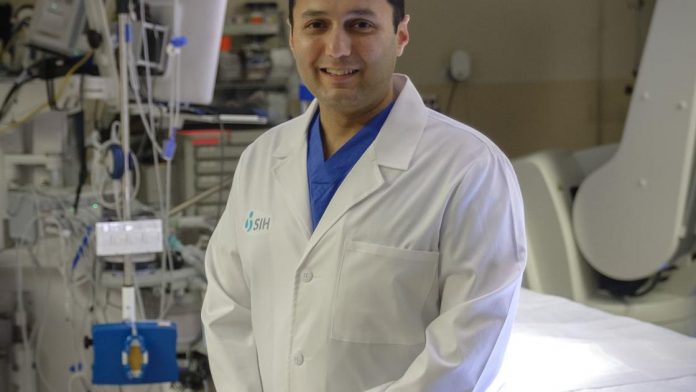Dr. Suven Shankar balked at having a portrait taken in his office. “It’s too messy,” he resisted.
Used to physicians’ desks covered in medical books, insurance forms and case files, the photographer convinced the SIH surgical oncologist to show him just how bad it really was.
Dr. Shankar was right — to a degree. Yes, the desk had a few textbooks on one corner. Photocopies of journal articles waiting to be read were stacked on another and yellow sticky notes hung from the computer monitor. Not too messy. It was, however, the rest of the office that would prove more difficult.
Strung just overhead was a lattice of string and yarn, crisscrossing from wall to wall. Its height was sufficient to allow movement, but the web was low enough that it would show in any photos.
The floor was a mess, too, covered with dozens of brightly colored inflated balloons; so numerous that every step kicked — or popped — at least one. Like the string overhead, the balloons were a “gift” from the nurses, technicians and other team members who work with Dr. Shankar every day at the SIH Cancer Institute, placed in honor of his 39th birthday. And though he appreciated the decorations, he was right: his office was not suitable for the picture.
So then the surgical oncologist had to find another location within the sprawling facility for the portrait. He was OK with that because Dr. Shankar is not afraid of challenges. In fact, he’s seen his share of them.
Growing up in southern India, he remembers weighing two distinct career paths: a desire to be a fighter pilot in the Indian Air Force against a love of medicine, gained by accompanying his father, an orthopedic surgeon, on weekend hospital rounds.
Broaching the subject of flying with his mother helped in making a decision.
“’Uh, no. You’re not doing that,’ my mom said about me flying,” he recalls.
Despite his exposure to medicine, pursuing a career similar to his father’s was not easy.
Dr. Shankar explains, “Getting into medical school in India was so competitive. Not to say that it is not competitive here, but there the population applying compared to the number of available slots is just ginormous.”
He not only got into medical school, but thrived at it. His success led to another challenge: attempting to secure a rare spot as a foreign medical graduate in a U.S. surgical residency. Again, he rose to the challenge, gaining not just a medical internship, but one at the prestigious Mayo Clinic. Dr. Shankar followed continued general surgical residencies at Vanderbilt and the Ochsner Clinic Foundation in New Orleans.
Choosing to specialize in oncological surgery — focusing on treating cancer patients — not for any personal experience, but because fighting cancer presented a bigger challenge, Dr. Shankar applied and was accepted to a fellowship at Mercy Medical Center in Baltimore.
“I enjoyed the complex cases and the complex surgeries that came with them,” he says. “I felt that surgical oncology was a way of bettering myself as a surgeon and taking care of these patients.”
He brought this cutting-edge approach to the SIH Cancer Institute in 2013.
“Since then, we’ve been able to do what previously would send people to St. Louis,” the father of three shares. “Things like minimally-invasive procedures for pancreatic cancer, esophageal cancer and liver cancer. We’ve been able to give people the option of staying closer to home for their treatments.”
Since 2016, Dr. Shankar has been the only physician in the region performing HIPEC procedures. Short for Hyperthermic Intraperitoneal Chemotherapy, this is a very specialized approach to treating abdominal cancer through delivering highly concentrated, heated chemotherapy directly to cancer cells.
“It is for patients who have Stage Four appendix, colon and some other abdominal cancers,” he says. “The challenging cases.”
He also has led the introduction of robotic cancer surgeries.
“We’ve been doing robotic colon, rectal and pancreatic surgery and last year did our first robotic surgery for esophageal cancer,” he adds.
As he uses the pronoun “we,” the choice is very intentional. For Dr. Shankar, every case is handled in close cooperation with other physicians, nurses and specialists.
“It’s a team approach,” he explains. “We work together, all of us — the medical oncologist, the radiation doctors, the operating room team, the anesthesiologist, my colleagues, everyone — to make sure everybody’s on board and to be able to offer our patients complex surgical care to improve outcomes so that they can recover quickly from surgery and continue with treatment and their lives.”
A self-proclaimed “foodie” who loves cuisines of all kinds and enjoys cooking, Dr. Shankar says having all of the right team members — even those who filled his office with yarn and balloons — working closely together is akin to the challenge of preparing dishes with the perfect blend of techniques, flavors and spices.
“Cooking is an art and so is surgery,” he says. “When you get all of the ingredients right, you end up with something that is so beautiful.”





































